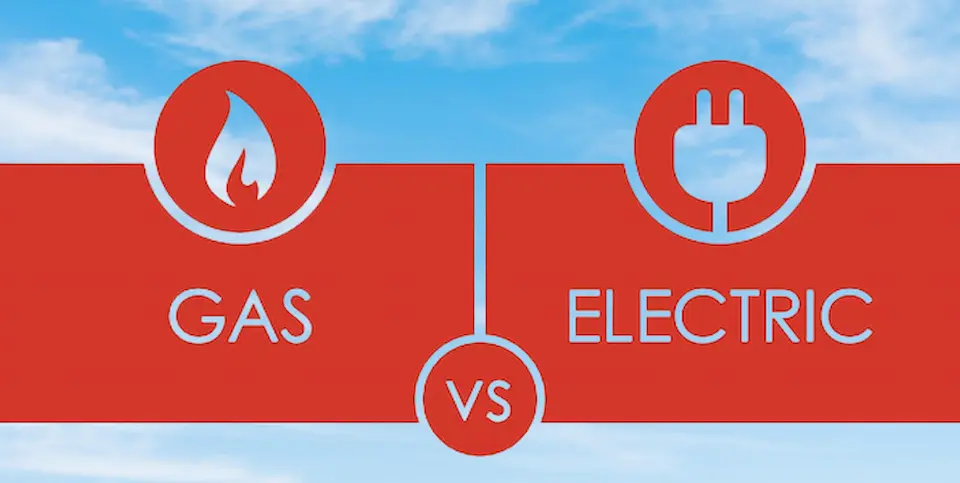January 23, 2023
What Is Cheaper, Gas Or Electric Heat?

Many of our Raleigh residential heating service customers ask us which is cheaper: gas vs electric heat?
Looking at the pros and cons of gas vs electric furnaces, heat pumps, and water heaters, we will do our best to consider all aspects of this long-running debate. From installation costs, energy costs, maintenance and repair expenses, how gas vs electric heat measure up when it comes to comparing utility bills, and other factors, let’s explore which heating system is better for your home and budget.
Gas versus Electric: The Great Debate
As you’re making your way through the cold North Carolina winter months, you’ve probably noticed the rise in heating costs if your home uses gas or electric furnaces. In fact, in October 2022, the U.S. Energy Information Administration reported its Winter Fuel Outlook. The report cites a 27%-28% increase in households that use natural gas or oil and a 10% increase in homes that use an electric heating system to stay warm.
As prices for both gas and electric heat continue to rise, the long-standing debate of which is better and cheaper marches on.
What is Gas Heat vs Electric Heat?
Natural gas has been used to heat homes for years, becoming a staple in American homes. While electric heat is relatively newer to US households, it’s been a contender for decades as a suitable alternative to gas and oil.
To really delve into the differences between gas and electric heat, it is important to understand how each heating system operates to heat your home.
Gas vs Electric Furnaces
Furnaces operate by converting either natural gas or electricity into a source of energy that circulates and warms the air throughout a space. A furnace’s forced air heating system is activated when your home’s thermostat goes down to a certain temperature, triggering the furnace’s effects because the air inside the house is cold.
In gas units, the thermostat triggers a pilot light, igniting the gas burner inside the furnace to burn fuel. In electric units, an electrical ignition system lights the furnace instead of a pilot light, and electricity functions as the source of your home’s heat.
Gas vs Electric Water Heaters
Water heaters also come in systems that operate off of either natural gas or electric heat. Gas water heaters, much like gas furnaces, use a pilot light that ignites and heats the water through a flue in the tank. This then generates heat by burning fuel from a propane tank or natural gas to keep your house from getting cold.
Electric water heaters bring in water through a dip tube, activating the metal heating elements submerged in the water of the tank to rise and heat your home. Electric water heaters, unlike gas water heaters, have a thermostat, pressure relief valve, and drain valve. Electric water heaters are plugged into an electrical supply, whereas gas water heaters are connected through a gas line.
Gas vs Electric Heat Pumps
When looking at how a heat pump works, once again electrical heat pumps generate energy from electricity whereas gas-fueled heat pumps use gas to draw heat. Comparing electrical appliances to gas appliances, heat pumps are great alternatives to both water heaters and furnaces because a heat pump transfers heat from the outside to the inside to keep warm in the winter and from the inside to the outside to keep cool in the summer.
While the concept for both heat pump systems is the same, how they pull in hot or cold air is a different story. Electric heat pumps use electrical power and a cooling agent, like freon, and no combustive materials. In contrast, gas heat pumps use combustive fuel from a gas supply to transfer hot and cold air.
Benefits of Gas Furnaces and Electric Furnaces
Looking at a head-to-head comparison of gas vs electric furnaces, let’s consider the pros and cons of each home heating system.
Pros and Cons of Gas Furnaces
Some advantages of gas furnaces over electric furnaces are:
- Less expensive to operate.
- Fast acting to heat your home.
- Less energy is needed to heat a space.
Some disadvantages of gas furnaces, when compared to electric furnaces, are:
- Shorter lifespan.
- Initial costs of installation are higher.
- The use of combustive materials makes safety a concern.
- Burning fuels are harmful to the environment.
Pros and Cons of Electric Furnaces
Electric furnaces have some advantages over gas ones, such as:
- Lower installation costs.
- Longer lifespan.
- The safer home heating option.
Like gas furnaces, electric furnaces have some drawbacks as well. Some disadvantages are:
- Higher monthly energy bills.
- It takes longer to generate heat.
- Heating is less efficient in circulating throughout the whole home.
Which is Cheaper: Gas Heat or Electric Heat?
When it comes down directly to cost savings, electric furnaces have lower installation costs when compared to the higher installation and maintenance costs of gas furnaces. However, gas furnaces cost less to operate than electric ones. Due to the lower monthly electric bills, gas heat furnaces come out on top as the less expensive overall choice.
It’s important to note that the safety concerns and effect on the environment of gas furnaces are a big concern, so if you are looking at how an electric furnace will lower energy costs and how unreliable natural gas costs can tend to be from year to year, an electric furnace could be the better choice for you.
For optimal energy and cost savings, installing a new heat pump is the biggest money-saving choice you can make for your home and family.
Are Energy Prices Expected to Rise in 2023?
HVAC professionals have already announced that there will be an increase in energy prices for both gas heat and electric heat in 2023. From rises in natural gas prices to the increase in electric heating costs, energy consumption in the U.S. will see higher heating bills and operating costs.
If your home furnace or other heating and cooling system need repairs or if you are looking to replace your system with a more energy-efficient heat pump, our Raleigh heating and cooling installation experts can convert your current system into one that will save money or reduce your energy consumption.
Contact Bowman Mechanical For All Your Gas Furnace And Electric Heat Pump Needs
Are you looking for a new heating system for your NC home or does your current gas furnace or electric furnace need repairs? Our winter heating installation contractors at Bowman Mechanical are here to update your old heating system into a less expensive and more energy-efficient home heating system.
Contact us today at [phone] or fill out our contact form below to get started.

